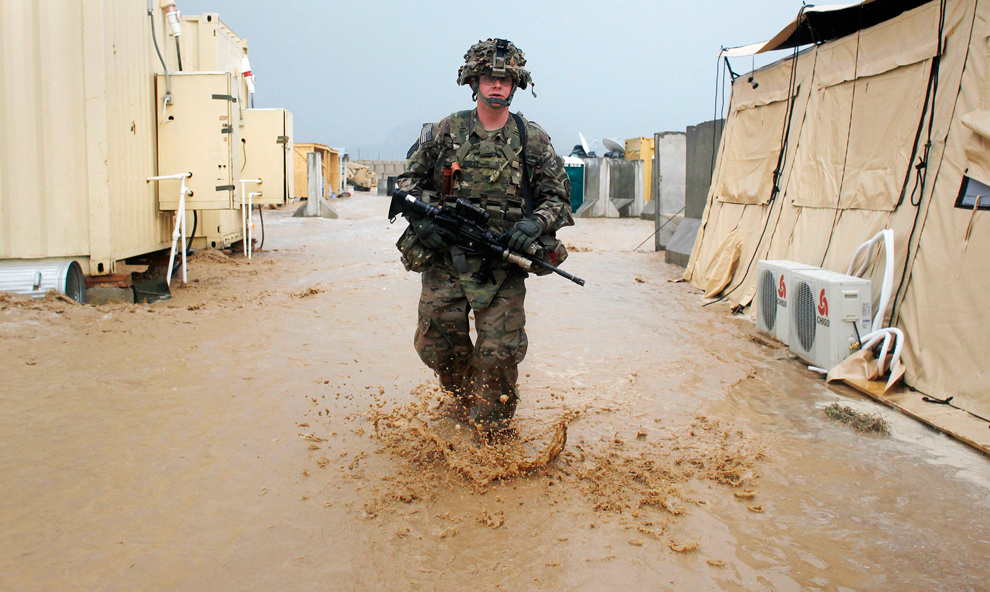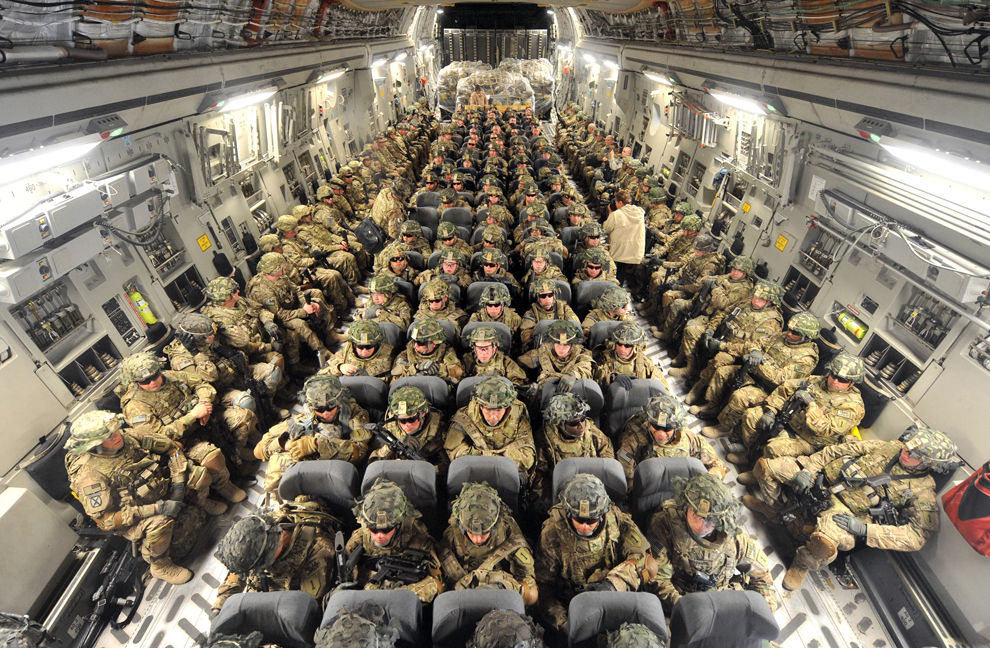Lest we forget, U.S. troops invaded Afghanistan in 2001 to capture Osama bin Laden and to neutralize the safe haven from which Al Qaeda might operate. It is now ten years later. Osama bin Laden is dead. Al Qaeda’s always small presence in Afghanistan remains small, largely unaffected by a war that has cost 1.2 trillion dollars and the lives of more than 4,600 U.S. troops—with casualties on the rise. And so we might assume that the presidential promise of a substantial troop drawdown in the summer of 2011 would be impending. But apparently not.
The U.S. currently has 94,000 troops in Afghanistan. The WSJ reports that the Pentagon is about to propose bringing 5,000 troops home in July and possibly another 5,000 troops by the end of the year. That would make for a 10.5% reduction in troops, hardly what one might imagine as a significant withdrawal. But it gets better, with other reports indicating that the total number of U.S. troops in Afghanistan is expected to peak at about 98,000 later in the year as the surge of 30,000 troops promised in January are deployed. So a 10.5% reduction actually turns out to be a 1% increase.
In this context, the photograph above reminded me of Pete Seeger’s “Waist Deep in the Big Muddy.” The song, often taken as a parable for U.S. involvement in the Vietnam War, tells the story of a platoon Captain in 1941 who marched his men into a Louisiana river—the Big Muddy—which continues to get deeper and deeper until the entire patrol is up to its neck in water. Despite warnings from the Sergeant that the men will not be able to swim, the Captain responds by noting “All we need is a little determination.” And the refrain intones, “And the big fool said to push on.” Eventually the Captain drowns after getting mired in quicksand. And the narrator concludes:
Now I’m not going to point to any moral—
I’ll leave that for yourself.
Maybe you’re still walking, you’re still talking
You’d like to keep your health.
But every time I read the papers, that old feeling comes on,
We’re waist deep in the Big Muddy
And the big fool says to push on.
In the photograph above the soldier walking through a combat outpost in the Kandahar Province is only ankle deep in the flood waters. And so one would like to think that there is still hope for him—and the 94,000 troops he currently represents. But then there is this photograph that appeared in the same slideshow and what it shows surely must give us pause to wonder.
It is a group portrait of the 234th Infantry Division being deployed from Fort Riley, Kansas to Afghanistan on April 15th. And apparently there will be more before year’s end.
“And the big fool said to push on ….”
Photo Credit: Bob Strong/Reuters; Vyaceslav Oseledko/AFT/Getty Images.
Cross-posted at BAGnewsNotes.


Cool post! The second picture is particularly troubling as it seems to resonate with the composition of another famous image of the caskets returning home at Dover. Here are two examples:
http://warisacrime.org/node/40847
http://weaselzippers.us/2011/05/06/flashback-obama-allows-photos-dead-u-s-troops/
It’s as though the second image that you posted above serves as a screen memory for the trauma of soldiers’ more visible deaths several years ago.
We need to ask, then, who is the big fool that demands so much pushing on? Is it President Obama – Commander in Chief? Robert Gates? Or is it something more dispersed, something like the collective American psyche, in its uncontrollable, insatiable desire for military adventure?
Who is demanding the soldiers to push on? It’s too easy to say that it’s all of us US citizens, in our complicity at the gas pump, at the shopping mall, at the burger stand, at the television, and at our computers. For questions of collective moral responsibility need to be historicized, too. To lay the stakes of blame and redemption at the determined feet of US consumer capitalism qua imperialism is to embrace the ahistorical delusion that if we “just stop” — if we turn our soldiers around and walk back out of the Big Muddy, or if we “just stop” the consumption — then we will have quieted the call to push on, we will have arrived at moral rectitude, and, by extension, we will have become agents in creating a better world.
But in the present world – the world of actual states of affairs – US militarism amounts to a structure so large that if it were to be dismantled (Obama/Gates pull the Brakes), then we have to wonder if the result will not be a better world, but rather if we will be trading one kind of chaos for another kind of chaos. One tragic context would displace the present tragic context.
This is a claim about economics, and the degree to which the US military is the engine of the US/global economy. With Eisenhower’s 1961 warning of the military industrial complex still in sight, the admission that nobody can “just stop” the march into the Big Muddy may strike some as tragic resignation, but the admission is now so essential to the present world that we have to wonder whether there might not be something, dare we say it, liberating, in affirming the forward historical march. For there will always be chaos; the best we can do is contain it, organize it perhaps, and keep it at bay (fight there, not here).
The big fool is foolish for demanding behavior that needs no coaxing.
Vet:
As to the idea that any action (including withdrawal) entails risk: Yes, things could always be “worse.” But then again, we can’t know that they would be for all we have to go on is a rather dystopian supposition–beyond that my crystal ball is broken. What we can know is what we have done and the effects it has had. And right now we have a ledger with 1.2 trillion dollars and 4,600 + dead U.S. soldiers (and counting) (plus other casualties, both U.S. and otherwise that are incalculable but surely substantial) on one side, and one dead terrorist on the other side. I’m thinking that it is a risk that I would be willing to take.